
Euphorbia is a very large and diverse genus of flowering plants, commonly called spurge, in the family Euphorbiaceae. "Euphorbia" is sometimes used in ordinary English to collectively refer to all members of Euphorbiaceae, not just to members of the genus.

Euphorbia heterophylla, also known under the common names of Mexican fireplant, painted euphorbia, Japanese poinsettia, paintedleaf, painted spurge and milkweed, is a plant belonging to the Euphorbiaceae or spurge family.
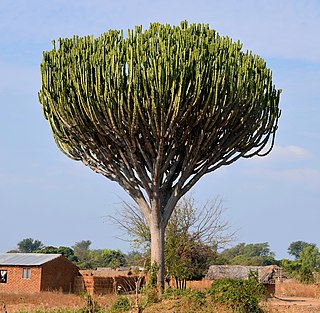
Euphorbia ingens is a species of flowering plant in the family Euphorbiaceae. It is native to dry areas of southern Africa. It is popularly known as the candelabra tree or naboom. Its milky latex can be extremely poisonous and is a dangerous irritant.

Euphorbia caput-medusae is a plant of the genus Euphorbia that occurs in and around Cape Town, South Africa.

The North-West University Botanical Garden on the Potchefstroom Campus of the North-West University (NWU) is the only botanical garden in the North West Province of South Africa. The Garden spans just under three hectares and is open to the public.
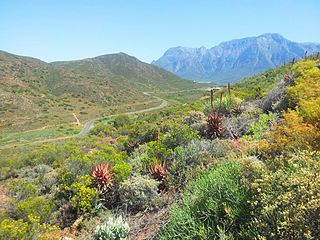
Robertson Karoo is a semi-arid vegetation type, restricted to sections of the Breede River Valley, Western Cape Province, South Africa. It is a subtype of Succulent Karoo and is characterised by the dominance of succulent plant species, and by several endemic plants and animals.
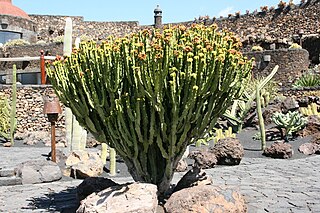
Euphorbia abyssinica, commonly known as the desert candle or candelabra spurge, is a species of plant in the family Euphorbiaceae. E. abyssinica is endemic to Ethiopia, Somalia, Sudan and Eritrea. It was first described in 1791, by the German botanist Johann Friedrich Gmelin. In its native habitat, it can grow up to 10 m (33 ft) tall. The woody stem is used for firewood and as timber in roofing, furniture and other items, and the sap is used in traditional medicine. It is also cultivated as an ornamental house plant.

Euphorbia clavarioides, lion's spoor, anthill euphorbia, is a species of herbaceous plant in the family Euphorbiaceae. It is native to Botswana, Lesotho, and South Africa. It may grow to 18 cm in diameter, with a height of 30 cm. Its flowers are yellow.

Euphorbia tuberosa, commonly known as '"milkball/melkbol"' or '"wilderamenas"', is a variable geophytic plant of the family Euphorbiaceae, indigenous to the western parts of South Africa.
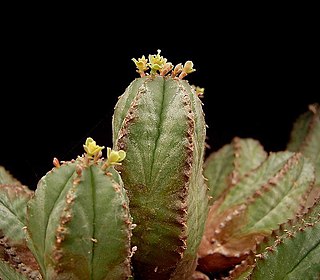
Euphorbia nesemannii, commonly known as Nesemann's euphorbia, is a species of plant in the family Euphorbiaceae native to the Western Cape province in South Africa.

Euphorbia bupleurifolia, commonly known as cycad spurge or pine cone plant, is a species of plant in the family Euphorbiaceae.

Euphorbia triangularis, commonly known as river naboom, river euphorbia, chandelier-tree or tree euphorbia, is a species of plant in the family Euphorbiaceae native to southern Africa.

Euphorbia globosa, commonly known as globose euphorbia or globose spurge, is a species of plant in the family Euphorbiaceae native to southern Africa.

Euphorbia groenewaldii is a species of flowering plant in the family Euphorbiaceae native to southern Africa. It is listed as endemic to and Critically Endangered in South Africa due to habitat destruction and overcollection. Kew's Plants of the World Online also lists it as native to Mozambique.

Euphorbia grandidens, commonly known as valleybush euphorbia or large-toothed euphorbia, is a species of plant in the family Euphorbiaceae native to southern Africa.
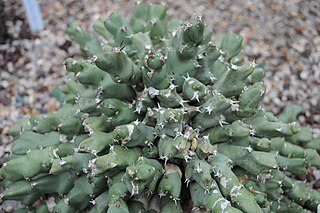
Euphorbia clivicola is a species of plant in the family Euphorbiaceae native to southern Africa.

Euphorbia barnardii, commonly known as mokgwakgwatha, is a species of plant in the family Euphorbiaceae native to southern Africa.

Euphorbia mauritanica, commonly known as yellow milk bush or golden spurge, is a species of plant in the family Euphorbiaceae native to Africa.

Euphorbia grandialata is a species of flowering plant in the family Euphorbiaceae. It is endemic to South Africa in the Northern Cape. It was named by Robert Allen Dyer, in 1937.



















